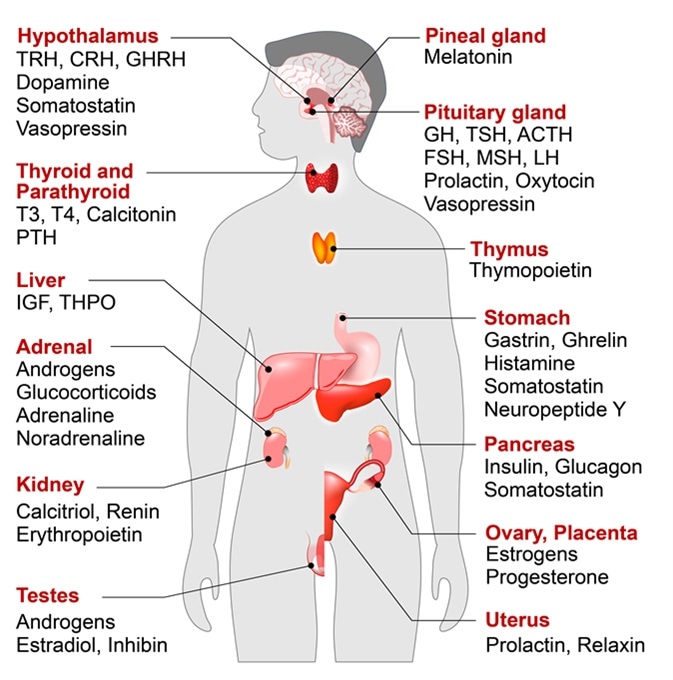What Are Hormones?
Hormones are signaling molecules that relay specific chemical messages throughout the body. They travel through tissue fluids, such as the bloodstream to stimulate particular cells or tissues and exert their effects.
The body produces many different types of hormones. Together, hormones act on almost every cell, organ and bodily process and function. In particular, hormones play a vital role in the regulation of growth and development, cognition, metabolism, hunger/thirst, reproductive processes and sexual function. Such processes are highly important for normal development in young children.
Kids Growth Hormones and Heredity
Hormones and the Endocrine System
Hormones are produced and secreted into the bloodstream by groups of cells called glands – together, glands make up the ‘endocrine system’.
The major glands of the human endocrine system include the:
- Hypothalamus - referred to as a ‘neuroendocrine tissue’, the hypothalamus is a group of cells located at the base of the brain, which produce hormones that control other parts of the endocrine system, such as the pituitary.
- Pituitary - located under the hypothalamus, the pituitary gland is a vital component of the endocrine system as it releases several hormones for a variety of functions. For example, it produces growth hormone, which is needed for growth and development, meanwhile follicle stimulating hormone (FSH) and luteinizing hormone (LH) are released from the pituitary to control pubertal development.
- Thyroid - found in the neck, the thyroid gland produces and secretes two hormones into the blood, namely thyroxine (T4) and triiodothyronine (T3). These hormones are important for controlling metabolic processes, such as food digestion and heart rate, and support activity of the growth hormone.
- Adrenal - the adrenal glands make several hormones, including cortisol. Cortisol plays a role in metabolism, growth and the stress response of the body.
- Ovaries - produce the female sex hormones estrogen and progesterone, which are involved in the development of female sex organs, the menstrual cycle, fertility throughout life and breast development.
- Testes – produce the male sex hormone testosterone, which is important for spermatogenesis, growth and muscle mass as well as secondary sexual characteristics like facial and body hair.

Human hormonal system: Image Credit: Designua / Shutterstock
Hormonal Imbalance in Children
Hormones play a significant role in the development and overall health of a child, and this means that abnormal functioning of any endocrine gland in the body can have dramatic implications. Most disorders associated with hormonal imbalance are typically linked to abnormal growth or sexual development.
For example, during normal pubertal development, the hypothalamus releases corticotropin releasing hormone (CRH) which stimulates FSH and LH to be secreted from the pituitary, consequently causing the ovaries or testes to begin producing sex hormones.
However, if either one of the endocrine glands involved in this process start functioning abnormally and produce either too much or too little hormone, this directly impacts pubertal development. Precocious puberty, for instance, is when puberty onset occurs at a very early age in young children, meanwhile some adolescents can experience a delayed onset of puberty; both disorders may be caused by abnormal hormone secretion.
Children who may have a disorder caused by hormone imbalance require the attention of pediatric endocrinologists, who are specialized in the diagnosis and treatment of conditions involving the endocrine system.
References
Further Reading
Last Updated: Feb 26, 2019